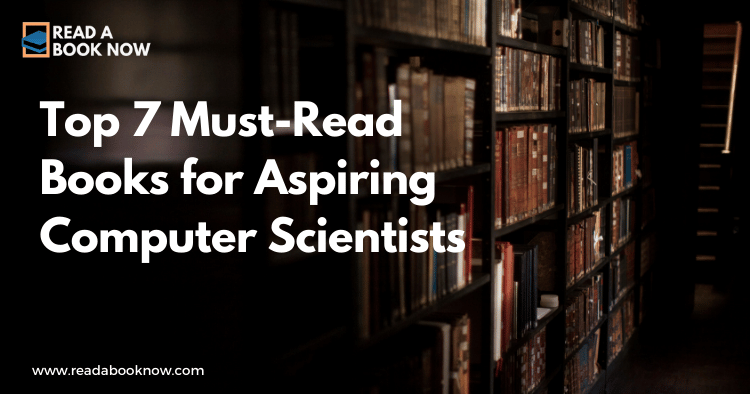Table of Contents
- Introduction
- 1. “Introduction to the Theory of Computation” by Michael Sipser
- 2. “Computer Networking: A Top-Down Approach” by James Kurose and Keith Ross
- 3. “Clean Code: A Handbook of Agile Software Craftsmanship” by Robert C. Martin
- 4. “Artificial Intelligence: A Modern Approach” by Stuart Russell and Peter Norvig
- 5. “The Pragmatic Programmer: Your Journey To Mastery” by Andrew Hunt and David Thomas
- 6. “Structure and Interpretation of Computer Programs” by Harold Abelson and Gerald Jay Sussman
- 7. “Code: The Hidden Language of Computer Hardware and Software” by Charles Petzold
- Conclusion
- FAQs
Introduction
The world of computer science is vast, fascinating, and ever-evolving. For aspiring computer scientists, the journey into this realm can be both exciting and overwhelming. With countless resources available, choosing the right ones to build a solid foundation can be a challenge. That’s why we’ve compiled a list of the Top 7 Must-Read Books for Aspiring Computer Scientists. These books cover essential theories and concepts, and they inspire creativity and problem-solving. Let’s dive into these crucial reads!
1. “Introduction to the Theory of Computation” by Michael Sipser
Michael Sipser’s “Introduction to the Theory of Computation” is a staple for anyone looking to grasp the abstract principles that underlie computer science. The book introduces key concepts such as automata, formal languages, and computational complexity in a clear and engaging manner.
Why Read It?
- Foundational Knowledge: Understanding computation theory is crucial for advanced studies in computer science.
- Problem-Solving Skills: The book presents problems that encourage critical thinking and analytical skills.
Key Takeaways
- Automata theory and formal languages
- Complexity classes and reducibility
For more insights, check out this comprehensive review on Goodreads.
2. “Computer Networking: A Top-Down Approach” by James Kurose and Keith Ross
This book takes a unique approach to teaching networking by starting at the application layer and working downwards. It is widely used in undergraduate courses, making it an essential read for anyone interested in network protocols and architecture.
Why Read It?
- Real-World Applications: It bridges theoretical concepts with practical applications, making complex topics easier to understand.
- Hands-On Learning: The book includes exercises and projects to solidify learning.
Key Takeaways
- TCP/IP model and protocols
- Network security issues
You can explore more about networking through this resource.
3. “Clean Code: A Handbook of Agile Software Craftsmanship” by Robert C. Martin
“Clean Code” emphasizes the importance of writing code that is not only functional but also clean and maintainable. Robert C. Martin, a veteran in software development, shares valuable insights on software craftsmanship.
Why Read It?
- Best Practices: Learn how to write code that is easy to read, understand, and modify.
- Agile Methodologies: The book discusses agile principles that are crucial in today’s fast-paced development environments.
Key Takeaways
- Principles of clean coding
- Refactoring techniques
For more detailed information, visit this link.
4. “Artificial Intelligence: A Modern Approach” by Stuart Russell and Peter Norvig
Often referred to as the definitive guide to AI, this book covers a wide range of topics including machine learning, natural language processing, and robotics.
Why Read It?
- Comprehensive Overview: It’s a go-to resource for both beginners and seasoned professionals in AI.
- Ethical Considerations: The book discusses the moral implications of AI technology.
Key Takeaways
- Search algorithms and optimization techniques
- Machine learning basics
Learn more about AI through this Wikipedia entry.
5. “The Pragmatic Programmer: Your Journey To Mastery” by Andrew Hunt and David Thomas
This book is a treasure trove of practical advice for software developers. It emphasizes the importance of flexibility and adaptability in a rapidly changing tech landscape.
Why Read It?
- Real-World Scenarios: The authors provide anecdotes and case studies that illustrate key points.
- Lifelong Learning: Encourages programmers to continually refine their skills.
Key Takeaways
- Tips for debugging and testing
- Strategies for effective communication
For a deeper look, check this link.
6. “Structure and Interpretation of Computer Programs” by Harold Abelson and Gerald Jay Sussman
This classic book introduces programming concepts using the Scheme programming language. It emphasizes the importance of abstraction in programming.
Why Read It?
- Conceptual Depth: Helps readers understand the underlying principles of programming and computation.
- Problem-Solving Framework: Encourages a structured approach to problem-solving.
Key Takeaways
- Recursion and higher-order functions
- Data abstraction and modular programming
You can access the book here.
7. “Code: The Hidden Language of Computer Hardware and Software” by Charles Petzold
Petzold’s book demystifies how computers work by breaking down complex topics into easily digestible concepts. This book is perfect for those who want to understand the relationship between hardware and software.
Why Read It?
- Accessible Language: Written in a friendly tone, it appeals to both novices and tech-savvy individuals.
- Historical Context: It provides a background on the evolution of computing technologies.
Key Takeaways
- Binary systems and logic gates
- The architecture of modern computers
For additional insights, check out this resource.
Conclusion
Reading is a crucial part of growing as a computer scientist. The books listed above provide not just theoretical knowledge but also practical insights to help you excel in your studies and future career. Whether you’re interested in algorithms, networking, software craftsmanship, or artificial intelligence, there’s something on this list for you. Happy reading!
FAQs
Q1: Why should I read these books?
These books offer foundational knowledge, practical skills, and insights that are invaluable for anyone pursuing a career in computer science.
Q2: Do I need to read all of them?
While all are beneficial, you can start with the ones that align more closely with your interests or current studies.
Q3: Are these books suitable for beginners?
Yes, most of these books are designed to be accessible to beginners while still offering depth for more advanced readers.
Q4: Where can I find these books?
You can find them at local libraries, bookstores, or online retailers like Amazon and the publishers’ websites.
Feel free to reach out with any more questions, and happy exploring in the world of computer science!
Also Look For:
For additional reading and insights into literature that shapes thought processes and creativity, consider exploring the timeless classics from various eras. You can find inspiration in the following articles:




